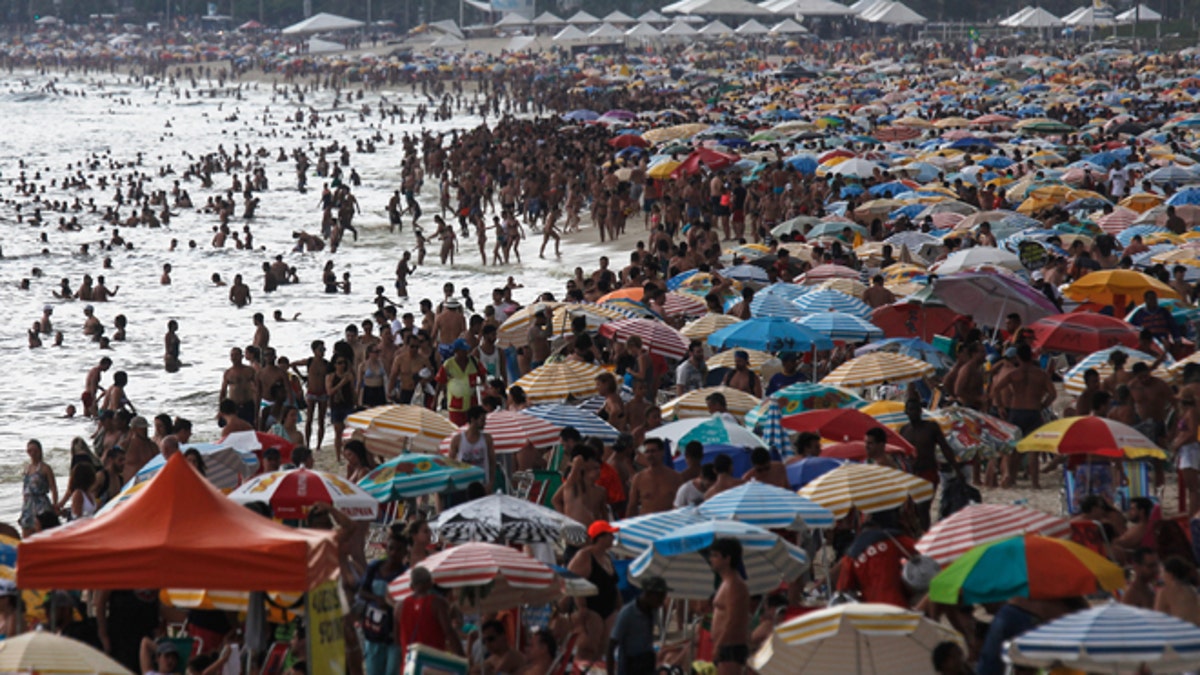
Crowds jam Ipanema beach in Rio de Janeiro, Brazil. (Photo by Mario Tama/Getty Images) (2015 Getty Images)
Rio de Janeiro – On the sandy beaches of Ipanema and Copacabana in Rio de Janeiro, where tourists come to play and hawkers of sarongs and coconut water set up their stalls, the summer heat of December and January also brings with it a threat that most visitors aren’t familiar with: Arrastões.
That’s the term – roughly translating as “trawlers” – used for when a group of young kids, usually from slums in the city, go out together running through the beach and grabbing bags, smart phones – whatever they can get their hands on as they scamper past – and attacking people.
Often the arrastãoes take place in the late afternoon, when many sunbathers are leaving the beach and heading toward bus and subway stations. Although the main objective is to carry out robberies, the victims usually end up suffering from other types of violence, such as assaults and intimidation.
Retired psychologist Silvia Moreira was the victim of three just last summer: one on the beach, on the street and one in her car. After each, she had to be hospitalized.
"It was because of an arrastão that I hit [another] car and was hospitalized for 40 days," she told Fox News Latino. "In the other, the assailants had knives and cut my arm. It is a collective fear – they work as a group to create a lot of fear and make people vulnerable. My daughter was beaten by a boy when she refused to give up her purse on the beach last week".
A local police officer who works around Ipanema and Leblon beaches and asked not to be identified, said that, when arrastãoes happen, they are uncontrolable.
"They come in big groups," he said. "Police officers try to avoid it, but once it happens, there are always victims. We run after them, but because they are minors, there is not a lot we can do. People aren't just robbed – they are also hurt and scared."
In October, about 92 people, including 78 minors and 2 children, were arrested after they allegedly robbed shops and assaulted pedestrians on Nossa Senhora de Copacabana, the main commercial avenue in the tourist district.
Gabriela Souza, who was on Nossa Senhora that day, said that the overwhelming feeling is one of "despair."
"They came running between the cars and the sidewalks,” Souza told FNL. “They knocked down pedestrians and tried to enter the stores. Everyone had to act fast to close their shops."
Arrastões are a Rio phenomenon that began as far back as the early 1990s, but their frequency and size has increased dramatically in recent years. According to the Institute of Public Security, during the summer, the number of such incidents can reach two a day and involve more than 20 young people in each. During the week, the likeliest settings are on streets and buses. On weekends, it mostly happens on the beach.
Most of the people arrested for these attacks are poor teenagers and kids from the favelas, and efforts to combat this type of crime, critics say, tend to add to the divide between rich and poor and contribute to racism.
Brazilian sociologist Ignacio Canto says the problem is a complicated one. "Many victims are workers from the less affluent classes, residents of the suburbs,” he pointed out.
Earlier this year, police were searching young people who bused to the beach from the poorest neighborhoods of the city. A number of "militias" also were reported to have cropped up, composed of middle-class people, who intimidated random kids.
Cariocas – as residents of Rio are known – take pride in some of the city’s public spaces, such as it’s beaches, being democratic, with the poorest having as much access as the wealthiest. But that is something of a lie, says historian and lawyer Rafael Soares.
"These are groups of young people, teenagers, occupying a space where they do not entirely belong,” Soares told FNL. “There is a view of the beach as a democratic space, but it is not."
The arrastões add to a level of fear over crime in the city. In August, even with thousands of extra police officers and soldiers patrolling the city during the Olympic Games, 386 murders took place in Rio, a 17.5 percent increase over the same month in 2015.
Monica Figueiredo, a retiree, doesn’t have the best expectations for the coming summer.
"Cases of theft are very common. You cannot leave anything out or exposed,” she told FNL. “I avoid the beach, especially on weekends."




















